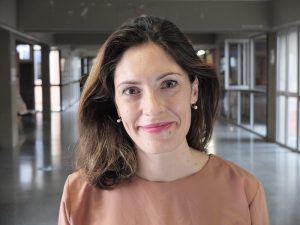Elisabetta Aurino awarded an ERC grant for her groundbreaking research on adolescent development
 Elisabetta Aurino is a development economist working on food security and child and adolescent health, nutrition and education. Her research aims to contribute to positive societal change through better food security, health and education for all children.
Elisabetta Aurino is a development economist working on food security and child and adolescent health, nutrition and education. Her research aims to contribute to positive societal change through better food security, health and education for all children.
Aurino is Assistant Professor of Development Economics at the University of Barcelona School of Economics since January 2022, and is the recipient of a Starting Grant from the European Research Council (ERC) for her project “Leveraging Early Adolescence for Development: Longitudinal and Experimental Evidence from Ghana”. She is also recipient of a prestigious ‘Jacobs Foundation’ fellowship, a globally-competitive grant for multidisciplinary scholars working in child development.
The work focuses on early adolescence (10-14 years) a delicate stage in human life during which strategic interventions can have a dramatic impact on individual future well-being, both in terms of seizing opportunities and in preventing health or economic risks. Unfortunately, evidence on ‘what works’ at this stage is scarce, especially in economically disadvantaged world areas, where 90 % of the world’s 1.2 billion adolescents live. Further, we don’t currently know whether investments at this stage can boost effectiveness of support received earlier in life (e.g. early childhood care) or make up, at least partially, for early-life poverty.
Aurino’s research aims to address this lack of evidence by developing and testing an innovative and digital parenting program to support adolescents in Ghana. This intervention will be tested by relying on a sample of 2,500 children and their parents. This sample is unique as children were part of a randomised experiment testing whether improved quality preschools were effective for their academic and social development in 2015, and were followed up since.
This experimental and longitudinal sample will allow to test the complementarities between early childhood and early adolescence investments, or whether interventions in adolescence can compensate for previous lack of support during the early years. Children and their parents will be interviewed using quantitative and qualitative surveys at 13, 15 and 17 years. Outcomes include adolescent social-emotional and academic skills, health, and adult-life transitions, such as school drop-out, early marriage and work. Innovative measures of stress biomarkers will be also collected.
Recent news
- Four researchers of the UB School of Economics are listed in the 2% of the world’s most influential scientists
- The second edition of the UB School of Economics Young Researchers Meeting highlighted the excellence of the research done in the field of Economics at the UB
- How the adoption of robots has influenced global sourcing activities among Spanish manufacturing firms
- A Closer Look at the MSc in Economics Class of 2025
- Call for expressions of interest for Assistant Professor positions
- A recent UB study analyzes the environmental and economic impact of flight ticket taxes in Europe
- Would you like to join us for a coffee with researchers from the Faculty?
- UB School of Economics is recruiting two tenure-elegible lecturers
- Call for expressions of interest: PhD Fellowships in Economics

Sorry, the comment form is closed at this time.